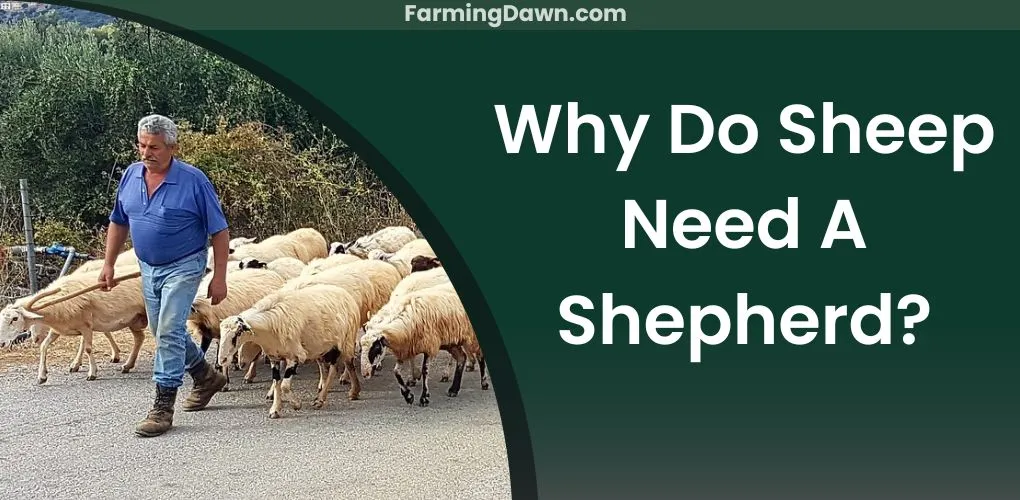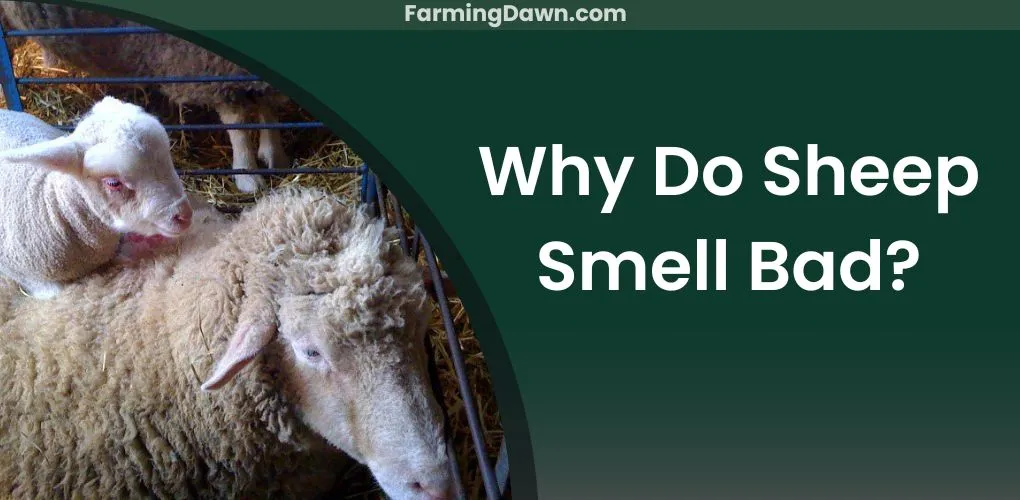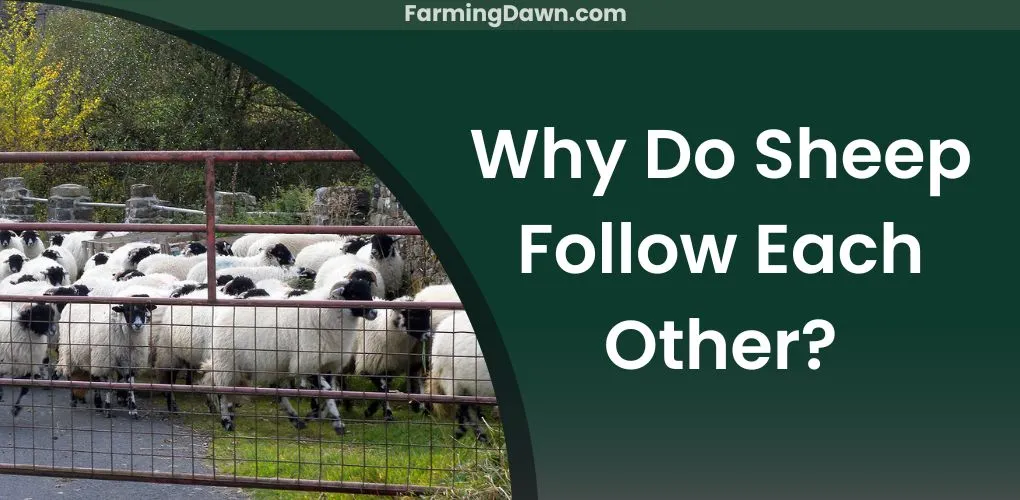Sheep are fascinating creatures with unique social and behavioral traits. But have you ever wondered why do sheep need a shepherd? As someone who has spent years working with livestock, I can attest to the fact that sheep are not the easiest animals to manage.
You might think these fluffy creatures can fend for themselves, but the truth is they rely on a shepherd to lead and protect them. They require specialized care and attention, especially when it comes to grazing and predator control. Today I will talk about the glorifying shepherd and sheep relationship and why do sheep need a shepherd within the flock.
The Shepherd and Sheep Relationship
The shepherd and sheep relationship is crucial for sustainable farming. The relationship between a shepherd and his sheep is like that of a parent and child. The shepherd must provide guidance and care for the sheep, much like a parent nurtures and guides a child. The shepherd must know the needs of his sheep and work to meet them.
The shepherd must also protect the sheep from predators and other dangers. This requires constant vigilance and the ability to anticipate potential threats. The shepherd must be able to read the signs of danger and act to prevent harm to the flock.
In return, the sheep provide the shepherd with food and clothing. Both parties benefit from this symbiotic relationship. The shepherd provides for the sheep, and the sheep provide for the shepherd.
I believe that this relationship is essential for sustainable agriculture. I always encourage farmers to take on the role of shepherd and work closely with their livestock. This creates a deeper understanding of the needs of the animals and results in healthier, more productive livestock.
In addition, this relationship fosters a sense of responsibility and stewardship. The shepherd is entrusted with the care of the sheep and must work to ensure their well-being. This creates a deeper connection to the land and the animals, resulting in more sustainable farming practices.
Why Do Sheep Need A Shepherd?
Sheep are social animals and travel within a flock. I would like you to keep in mind that wild sheep do not require a shepherd than domesticated sheep. Domesticated sheep need a shepherd for various reasons. The shepherd provides safety to the sheep from predators, from other sheep within the flock, from bugs, weather etc.
Protection from Predators
Sheep are natural prey for many predators such as wolves, coyotes, and bears. A shepherd’s primary role is to provide protection against these beasts. By keeping a watchful eye over the sheep, a shepherd can quickly respond to any threat and take necessary action to keep the flock safe. Although sheep can run pretty fast, but in comparison of cheetah they have no chance of survival.
Protection from other sheep
Not only do sheep need protection from predators, but they also need protection from other sheep. Sheep have a hierarchical social structure, and fights between them can lead to injuries or even death. A shepherd can identify any signs of aggression or bullying and separate any sheep that are causing problems.
Protection from Weather
The weather can also be a danger to sheep. Harsh weather conditions such as snowstorms, heavy rain, or extreme heat can have a detrimental effect on the flock’s health. A shepherd can provide shelter, food, and water to ensure the flock stays healthy and comfortable.
Protection from Bugs and Worms
Bugs and worms can also pose a threat to sheep’s health. Fleas, ticks, and lice can cause skin irritation and transmit diseases. Parasitic worms can cause internal damage and lead to weight loss or death. A shepherd can administer preventative measures and treatments to control these pests.
Prevention from Bad decisions
A shepherd can also monitor the sheep’s activities and ensure they are making good decisions. Sheep are curious animals and can sometimes get off on their own and cause trouble. A shepherd can guide the flock toward safe areas and prevent them from eating harmful plants.
For Flock Wellbeing
Sheep are social animals that thrive in a flock. A shepherd can ensure the flock’s well-being by monitoring their interactions and preventing any conflicts. They can also encourage family bonds between the sheep, which can have a positive impact on the flock’s overall health and well-being.
Health Protection
A shepherd’s role is not only to protect the flock physically but also to ensure their health and well-being. A shepherd can administer vaccinations, treat injuries, and monitor the flock’s overall health. They can identify any signs of illness, and prevent diseases by taking the necessary measures from spreading.
Guidance and Protection
Lastly, a shepherd can provide guidance and protection to the flock. They can guide the flock toward food, water, and shelter. They can also protect them from any potential danger, ensuring their safety and well-being.
Sheep need Shepherds to Provide Food
A sheep has a four-chambered stomach, which is a sign that it is a ruminant. The specific design of stomach helps them digest and break down cellulose-rich plants. This allows them to survive on vegetation that is typically indigestible to other animals. However, sheep need a lot of food to maintain their body weight and produce wool, milk, and meat.
In the wild, sheep would roam and graze freely, but domesticated sheep are often kept in pastures or pens. These animals rely on their shepherds to provide them with enough food and water to keep them healthy and productive.

A good shepherd understands the dietary needs of their sheep and makes sure they have access to a variety of forage, including grasses, legumes, and browse. Shepherds need to rotate their sheep to different pastures to prevent overgrazing and to ensure the forage remains healthy and productive.
They also need to provide supplemental feed during times when forage is scarce, such as during the winter or in drought conditions.
Sheep are susceptible to a variety of health issues if they are poorly fed. For example, a lack of protein can lead to poor wool quality and reduced milk production. A proper diet can help in their production and increased lifespan of sheep.
Medically needy Sheep Require a Shepherd
When sheep get sick, they need shepherds to provide them with medical attention as soon as possible. A good shepherd knows the signs of illness in sheep and takes swift action to address the problem. They also take preventative measures to keep the flock healthy, such as ensuring that they have access to clean water and a balanced diet. By doing so, they minimize the risk of disease and other health issues.
The shepherd must be able to identify the cause and provide the proper treatment. Sheep are resilient creatures, but they need the support of a caring and attentive shepherd to stay healthy. Neglecting their medical needs can result in serious health problems and even death. This is why it is so important to have a knowledgeable and experienced shepherd looking after the flock.
Shepherds make Breeding Stock Selections
Breeding stock selection is an important aspect of sheep farming that determines the genetic makeup of the flock. The right selection can ensure that the flock is healthy and productive.
Shepherds need to have a keen eye for detail when selecting breeding stock. They should look for traits such as good health, temperament, and conformation. Good health ensures that the sheep are disease-free and can withstand environmental stressors. A good temperament is essential for easy handling, and good conformation is essential for producing quality meat and wool.
Breeding stock selection is not just about physical traits. Shepherds should also consider the genetics of the sheep. Genetic diversity is essential for a healthy and resilient flock. Shepherds need to maintain a balance between genetic diversity and desired traits.
How do Sheep Know their Shepherd?
Sheep have a unique ability to recognize their shepherd. They can recognize their shepherd by their voice, smell, and appearance.
When a shepherd takes care of sheep, he spends a lot of time with them, and this helps them to recognize his voice. The sheep become familiar with the sound of their shepherd’s voice, and they will respond to it. They can differentiate the shepherd’s voice from other voices and respond appropriately.
Apart from recognizing the shepherd’s voice, sheep also recognize their shepherd by their smell. Shepherds spend a lot of time with their sheep, and they have a distinct smell that the sheep can identify. They can differentiate the smell of their shepherd from the smell of other people or animals.
Sheep are also able to recognize their shepherd by their appearance. Shepherds often wear distinctive clothing, such as a hat or jacket, that the sheep can recognize. The sheep become accustomed to their shepherd’s appearance and can distinguish them from others.
Furthermore, sheep have a unique ability to read body language, and this helps them to recognize their shepherd. A shepherd who spends a lot of time with their sheep will develop a particular way of walking or moving that the sheep will recognize. The sheep become familiar with their shepherd’s body language and can identify them from a distance.
What Happens to the Sheep in the Absence of a Shepherd?
In the absence of a shepherd, sheep are vulnerable to predators. They become easy targets for wolves, coyotes, and other animals that prey on them. Without the protection of a shepherd, the sheep are at risk of being killed or injured.
Not only are sheep vulnerable to predators, but they can also get lost. Sheep often follow each other blindly, because they are not intelligent animals. In the absence of a shepherd, they can wander away from the flock and get lost, making it difficult for them to find food and water.
Furthermore, sheep can be prone to illness and disease. Without a shepherd to monitor their health and provide them with appropriate care, sick sheep can quickly spread illness throughout the flock, leading to the death of many animals.
Sheep also need guidance when it comes to food and water. They require a balanced diet and access to clean water to thrive. In the absence of a shepherd, the sheep may not know where to find these essential resources, leading to malnourishment and dehydration.
Why Do Sheep Need A Shepherd? Take Away
The age-old question of why sheep need a shepherd has been answered. To sum up, it is clear that the role of the shepherd in the life of a sheep cannot be overstated.
The shepherd ensures the safety of the sheep by protecting them from predators and other dangers, provides nourishment by guiding them to good grazing areas, and lastly provides a sense of order and structure for the sheep, which is essential for their well-being.
Thank you for reading this post. If you liked it, then share it with your friends interested in livestock farming.





